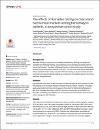The effects of Ramadan fasting on clinical and biochemical markers among hemodialysis patients: A prospective cohort study.
| المؤلف | Khazneh, Emad |
| المؤلف | Qaddumi, Jamal |
| المؤلف | Hamdan, Zakaria |
| المؤلف | Qudaimat, Falasteen |
| المؤلف | Sbitany, Asmaa |
| المؤلف | Jebrin, Kamel |
| المؤلف | Sawalmeh, Osama |
| المؤلف | Abuiram, Yousef |
| المؤلف | Shraim, Mujahed |
| تاريخ الإتاحة | 2019-07-01T04:50:17Z |
| تاريخ النشر | 2019-06-24 |
| اسم المنشور | PLOS ONE |
| المعرّف | http://dx.doi.org/10.1371/journal.pone.0218745 |
| الاقتباس | Khazneh E, Qaddumi J, Hamdan Z, Qudaimat F, Sbitany A, Jebrin K, et al. (2019) The effects of Ramadan fasting on clinical and biochemical markers among hemodialysis patients: A prospective cohort study. PLoS ONE 14(6): e0218745. https://doi.org/10.1371/journal.pone.0218745 |
| الملخص | Ramadan fasting is compulsory for all healthy adult Muslims. Although sick people are exempted from Ramadan fasting, some patients such as hemodialysis patients prefer to fast during Ramadan. The effect of Ramadan fasting on clinical outcomes and biochemical markers among hemodialysis patients is not clear. The aim of this study was to examine the effects of daily Ramadan fasting and partial Ramadan fasting on key biochemical and clinical markers among hemodialysis patients as compared to hemodialysis patients who chose not to fast during Ramadan. A prospective cohort study of 269 end stage renal disease patients were recruited from the hemodialysis unit in An-Najah National University Hospital, Nablus, Palestine. The participants were divided into three cohorts based on their plans for fasting during Ramadan in May 2018; Ramadan fasting group (RFG), Ramadan partial fasting group (RPFG) and Ramadan not-fasting group (RNFG). Key clinical and biochemical markers were measured before, during and after Ramadan. After adjustment for diabetic and hypertension status and other sociodemographic variables, RFG had higher mean inter-dialytic weight gain (IDWG) by 0.62 kg than RNFG (95% confidence interval (CI) 0.26, 0.99). RPFG also had slight increase in mean IDWG than RNFG by 0.35 kg (95% CI 0.11, 0.60). Additionally, RFG and RPFG had significant increase in mean serum potassium as compared to RNFG. Diabetes was independently associated with increased IDWG by 0.48 kg (0.25, 0.72). Diabetes and hypertension were associated with some independent changes in biochemical markers, but these were clinically negligible. Our findings suggest that Ramadan fasting (fully or partially) is tolerable by hemodialysis patients and is not associated with important clinical complications. However, these patients should be made aware of the potential risk of fluid overload and hyperkalemia, if they decide to fast during Ramadan. Thus, they should be closely monitored and instructed to adhere to their dietary and fluid intake allowances. Further prospective cohort studies with comprehensive dietary measures and information on adverse clinical outcomes may provide more evidence about the tolerability and safety of Ramadan fasting by hemodialysis patients. |
| راعي المشروع | The publication of this article was funded by the Qatar National Library. The funder had no role in study design, data collection and analysis, decision to publish, or preparation of the manuscript. |
| اللغة | en |
| الناشر | Public Library of Science |
| الموضوع | Ramadan fasting, Hemodialysis, Biochemical, Cohort study Ramadan fasting Hemodialysis Biochemical Cohort study |
| النوع | Article |
| رقم العدد | 6 |
| رقم المجلد | 14 |
| ESSN | 1932-6203 |
الملفات في هذه التسجيلة
هذه التسجيلة تظهر في المجموعات التالية
-
الصحة العامة [380 items ]


